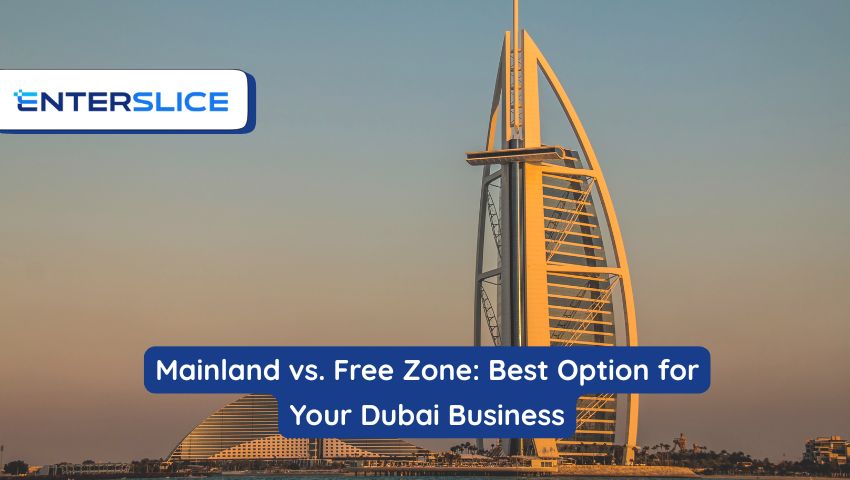Setting up a company in Dubai is an exciting venture, and choosing the right type of business setup is one of the most important decisions you’ll make. Dubai offers a variety of options for business owners, with two primary choices: mainland company formation in Dubai and Dubai free zone company registration. Each option has its unique benefits and challenges, and selecting the best one for your business will depend on your goals, target market, and the nature of your business.
In this guide, we will explore the differences between mainland and free zone company registration in Dubai and help you determine the best fit for your business.
1. What is Mainland Company Formation in Dubai?
Mainland company formation in Dubai refers to setting up a business within the geographical boundaries of the emirate, operating under the laws and regulations of the Dubai Department of Economic Development (DED). Mainland companies are not restricted to operating within the boundaries of a free zone and can engage in business activities throughout Dubai and across the UAE.
Key Features of Mainland Companies:
-
100% Ownership for UAE Nationals: For most types of mainland companies, a UAE national partner or sponsor is required to hold at least 51% of the company’s shares. However, this rule has seen recent changes, particularly in some sectors where foreign investors can now have full ownership, as part of the UAE’s efforts to attract international businesses.
-
Wide Market Access: Mainland companies have access to the entire UAE market, including both local and international clients. This is particularly important for businesses that wish to expand within the UAE or the GCC region.
-
No Restrictions on Business Activities: Mainland businesses can operate across a wide range of industries, from retail and trade to manufacturing and services. The possibilities are nearly limitless.
-
Commercial License: A mainland company is required to obtain a commercial license from the DED, which outlines the specific business activities that the company can undertake.
Advantages of Mainland Company Formation:
-
Flexibility in Location: You can operate from anywhere in Dubai, including popular business hubs such as Downtown Dubai or Business Bay. This flexibility allows your company to be closer to your target audience and take advantage of prime commercial areas.
-
Full Business Ownership (In Some Sectors): In certain business categories, such as technology, consultancy, and some other service sectors, foreign investors can now own 100% of their business.
-
Greater Opportunities for Expansion: With the ability to operate both within the UAE and abroad, mainland companies enjoy more growth potential and opportunities for international business dealings.
Challenges of Mainland Companies:
-
Local Sponsor Requirement: For most mainland company setups, you will need a local UAE national sponsor or partner who holds 51% of the company’s shares. This can be a significant limitation for some foreign investors.
-
Higher Operating Costs: Operating a mainland company may come with higher costs in terms of office space, licensing fees, and employee requirements.
2. What is Dubai Free Zone Company Registration?
A Dubai free zone company is a business setup located within one of the designated free zones in Dubai, each of which offers its own set of benefits and regulations. Free zones are specialized areas designed to attract foreign investment and businesses by offering simplified business setup procedures, tax incentives, and 100% foreign ownership.
Key Features of Free Zone Companies:
-
100% Foreign Ownership: One of the biggest attractions of Dubai free zones is that they allow foreign investors to have full ownership of their companies without the need for a local sponsor or partner.
-
Tax Incentives: Free zones often offer tax exemptions, including zero import/export duties, income tax exemptions for a specific period (usually 15-50 years), and the ability to repatriate 100% of profits and capital.
-
Limited Business Scope: Free zone companies are typically restricted to operating within the free zone or engaging in activities related to imports/exports. You will not be able to directly engage in the UAE’s local market unless you establish a separate distribution or sales channel.
-
Sector-Specific Zones: Dubai has various free zones tailored to different industries, such as technology, media, healthcare, and e-commerce. This specialization can be beneficial for certain types of businesses that require a niche market or industry expertise.
Advantages of Dubai Free Zone Company Registration:
-
Full Ownership: As mentioned earlier, free zone companies allow foreign nationals to retain 100% ownership, without needing a UAE national partner.
-
Tax Benefits: Many free zones offer attractive tax breaks, such as exemptions from import/export duties, VAT, and corporate tax for an extended period. This is a key incentive for businesses looking to reduce operating costs.
-
Simplified Setup Process: Free zone companies benefit from streamlined registration processes, which can make the setup more straightforward and quicker compared to mainland companies.
-
Access to Global Markets: Free zone companies are well-suited for international businesses that plan to engage primarily in import/export or services to foreign markets.
Challenges of Free Zone Companies:
-
Restricted Market Access: Free zone companies are typically not permitted to do business directly with the UAE local market unless they establish a separate distribution channel. This limitation can be a significant challenge for businesses intending to serve both local and international clients.
-
Location Constraints: A free zone company must operate within the confines of the designated free zone, which might not be ideal for businesses that require a central location in Dubai or proximity to certain industries.
3. Mainland vs. Free Zone: Which is the Best Option for Your Dubai Business?
The choice between mainland and free zone company formation in Dubai depends largely on your business goals, target market, and the industry you’re operating in. Let’s break down the key considerations to help you make the best decision.
1. Ownership and Control
If having full control over your company is crucial, then a Dubai free zone company is the clear winner. Free zones allow for 100% foreign ownership, whereas mainland companies generally require a local sponsor unless you are in an industry with specific exemptions.
2. Market Access
If your business aims to sell directly to the UAE market, then mainland company formation in Dubai is the best option. Mainland companies can access both the local and international markets, whereas free zone companies are generally restricted to operating within the free zone or focusing on international business.
3. Cost of Setup
The cost of setting up a company in Dubai can vary between the mainland and free zones. Mainland companies often involve higher setup and operating costs, including office space and licensing fees, while free zones typically offer cost-effective solutions with incentives like tax exemptions and low overhead.
4. Business Type
If your business is related to trading, import/export, or needs to have proximity to key industries like technology, media, or healthcare, then a free zone might be more suitable. Conversely, if your business is involved in real estate, retail, or services, mainland company formation in Dubai might be more advantageous.
5. Growth Potential
For businesses looking to expand within Dubai or the broader UAE market, a mainland company offers greater flexibility and potential for growth. Free zones are ideal for companies focusing on niche markets or international operations but may face limitations when expanding locally.
4. Conclusion
Both mainland and free zone company formation in Dubai offer distinct advantages depending on your business model. If you require full ownership, tax exemptions, and an international focus, setting up a Dubai free zone company could be the best route. However, if you’re looking for broader market access, greater flexibility, and the potential to expand within the UAE, mainland company formation in Dubai will likely be the better choice.
Before you begin the process of UAE company registration, it’s important to evaluate your business needs, long-term goals, and target audience. By understanding the nuances of both setups, you can make an informed decision that will position your business for success in one of the world’s most dynamic economies.
FAQ
1. What is the difference between a mainland and a free zone company in Dubai?
A mainland company in Dubai can operate across the UAE and may require a local sponsor, while a free zone company offers 100% foreign ownership but is typically limited to operating within the free zone or internationally.
2. Can I do business in the UAE mainland with a free zone company?
Free zone companies are restricted from directly trading within the UAE market. However, you can sell to the local market via an agent, distributor, or branch office setup.
3. Is it possible to switch from a free zone company to a mainland company in Dubai?
Yes, it is possible to switch from a free zone company to a mainland company in Dubai, but the process can be complex and may require re-registration and adjusting your business structure.



